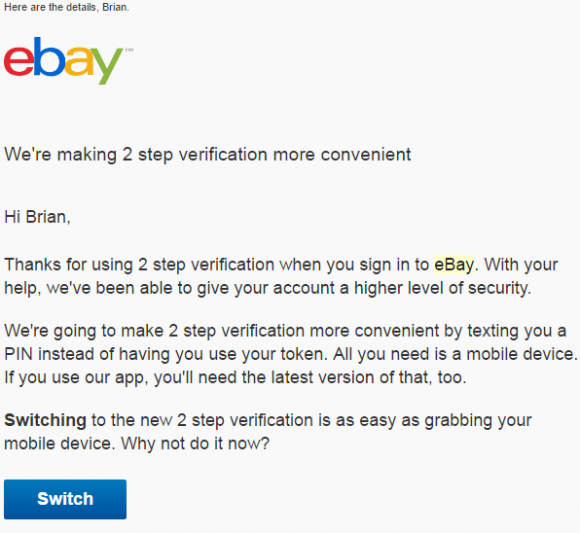eBay Asks Users to Downgrade Security
Last week, KrebsOnSecurity received an email from eBay. The company wanted me to switch from using a hardware key fob when logging into eBay to receiving a one-time code sent via text message. I found it remarkable that eBay, which at one time was well ahead of most e-commerce companies in providing more robust online authentication options, is now essentially trying to downgrade my login experience to a less-secure option.

“Armed with one of these keys, if you were to log on to your account from an unfamiliar computer and some invisible password stealing program were resident on the machine, the bad guys would still be required to know the numbers displayed on your token, which of course changes every 30 seconds. Likewise, if someone were to guess or otherwise finagle your PayPal password.”
The PayPal security key.
I’ve still got the same hardware token I ordered when writing about that offering, and it’s been working well for the past decade. Now, eBay is asking me to switch from the key fob to text messages, the latter being a form of authentication that security experts say is less secure than other forms of two-factor authentication (2FA).
The move by eBay comes just months after the National Institute for Standards and Technology (NIST) released a draft of new authentication guidelines that appear to be phasing out the use of SMS-based two-factor authentication. NIST said one-time codes that are texted to users over a mobile phone are vulnerable to interception, noting that thieves can divert the target’s SMS messages and calls to another device (either by social engineering a customer service person at the phone company, or via more advanced attacks like SS7 hacks).
I asked eBay to explain their rationale for suggesting this switch. I received a response suggesting the change was more about bringing authentication in-house (the security key is made by Verisign) and that eBay hopes offer additional multi-factor authentication options in the future.
“As a company, eBay is committed to providing a safe and secure marketplace for our millions of customers around the world,” eBay spokesman Ryan Moore wrote. “Our product team is constantly working on establishing new short-term and long-term, eBay-owned factors to address our customer’s security needs. To that end, we’ve launched SMS-based 2FA as a convenient 2FA option for eBay customers who already had hardware tokens issued through PayPal. eBay continues to work on advancing multi-factor authentication options for our users, with the end goal of making every solution more secure and more convenient. We look forward to sharing more as additional solutions are ready to launch.”
I think I’ll keep my key fob and continue using that for two-factor authentication on both PayPal and eBay, thank you very much. It’s not clear whether eBay is also phasing out the use of Symantec’s VIP Security Key App, which has long offered eBay and PayPal users alike more security than a texted one-time code. eBay did not respond to specific questions regarding this change.
Although SMS is not as secure as other forms of 2FA, it is probably better than nothing. Are you taking advantage of two-factor authentication wherever it is offered? The site twofactorauth.org maintains a fairly comprehensive list of companies that offer two-step or two-factor authentication.
Source: krebsonsecurity.com
 Reviewed by Anonymous
on
11:09 AM
Rating:
Reviewed by Anonymous
on
11:09 AM
Rating:





